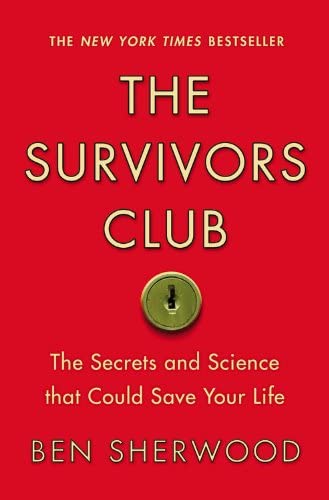The motto on the front of the bright red book is, “The Secrets and Science that Could Save Your Life.” Being a woman who prides herself in her status as a survivor and her determination to defend and prolong her life, I simply had to pick it up. Written by journalist Ben Sherwood,The Survivors Club is a collection of stories of ordinary people who have survived extraordinary events and the science behind what can help your chances of survival.
We live in a society that honors, broadcasts and almost idolizes those who die whether it be in combat, accidents, plane crashes, homicides or natural disasters. We embrace the knowledge that we are mortal so much so that when given hypothetical situations to consider, many people say things like, “Well, I’d just roll over and die,” or “That’s an impossible situation,” or “I’d be dead for sure.”
The general pessimism of impending doom has never fared well for people like me or my husband. We both shrug off the loom and gloom stories of those who have succumbed to untimely deaths but readily embrace those stories where people have prevailed despite all odds. “Give me a hero who LIVES!” I’ve heard my husband yell. And I agree.
This is why The Survivors Club came home from the library with me. It is a book dedicated to the people who live. Inspired by a near-death experience where a fellow journalist was killed, Ben Sherwood set out to see whether life and death was simply chance or whether he could increase his odds of prolonging the life he so loved. His findings led him to interview dozens upon dozens of people who have survived some of life’s most harrowing challenges. From a woman who beat off a mountain lion with her bare hands, to the only pilot to ever survive an ejection at sea level going faster than the speed of sound. From a man who survived both World Trade Center attacks (the car bomb in February, 1993 and the plane hijackings or September 2001) to the ballerina who danced for her life before Joseph Mengele during the Holocaust. The stories are no less than amazing and some even miraculous, but all are inspirational.
Yet the book is more than a collection of interviews of outlandish survival. It is also packed full of scientific studies, military and survival hints, tips and information that literally could save your life. Within its pages you learn the rules to withstand against hypothermia and what you could do to save your self in the event of a plane crash. You hear from experts in the fields of extreme medicine and psychology, all with the intent to show you how indestructible we humans can really be.
Finally, the book also casts a scientific eye on faith, purpose and mindset. Does faith in God and prayer really help your chances of survival? Does the desire to fulfill a purpose or love for a child or spouse really make you live longer? Can you hang on for one last birthday or to vote in the next election? Is there such a thing as lucky and unlucky? All of these questions are thoroughly researched and the answers are startlingly intriguing and, yes, encouraging.
At the end of the book you have the opportunity to take a test developed by leading doctors in the fields of survival and psychology to determine your “Survival Personality.” The idea is that knowing your strengths you can develop them for use should you even fall into a situation where you are struggling to survive, whether that “survival” is emotional or physical. The results can be both enlightening and entertaining.
Ben Sherwood writes wittingly and energetically about some of the most amazing survivalists in modern times. The book is fascinating, well-written and chalked so full of information you may want to read it with pen and paper handy to take note of the wealth of information. Often, I found myself whistling in amazement or yelling, “Honey, listen to this..” across the house as I read aloud.
I would recommend this book not only to those who are interested in survival in the physical means but also those who are struggling with emotional stress and depression. The information collected on Post traumatic Stress Disorder (PTSD), suicide, resilience and mental health is invaluable and the encouraging stories of those who have bounced back from such atrocities as the Holocaust, Vietnam, POW camps, rape and depression are inspirational.
I have already informed my husband that I plan on purchasing this book, not only as a reference guide to some great survivalist science, but also as an inspiration in those times I want to read about a hero who LIVES!

